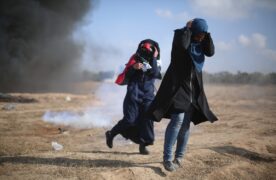It can displace farmers and destroy agricultural assets and food stocks. Or it can disrupt markets, driving up prices and damaging livelihoods. In this vicious circle, conflict and lack of food break down the very fabric of society, and all too often lead to violence.
These are the words of Marie Haga, Associate Vice-President of the External Relations and Governance Department at the United Nations International Fund for Agricultural Development (IFAD), who says “hunger is both a cause and a result of conflict.”
Causes such as conflict (war and inter-ethnic clashes), forced migration and land abandonment as the only option are behind the increased hunger seen in recent decades.
“Around 20 million people are facing famine in Yemen, South Sudan, Burkina Faso and north-eastern Nigeria,” says Haga in her article “Breaking the vicious circle of hunger and conflict”, published on the UN site for the Food Systems Summit 2021, which will take place in September.
Various country reports presented to the UN also demonstrate that illegitimate and illegal unilateral coercive measures – imposed by one state to punish and isolate another – are also driving major food insecurity, conflict and social destabilization.
 Development is being impeded through policies of economic, commercial and financial blockade that target various countries around the globe, including Syria, Venezuela, Cuba, Nicaragua and Iran.
Development is being impeded through policies of economic, commercial and financial blockade that target various countries around the globe, including Syria, Venezuela, Cuba, Nicaragua and Iran.
The 2021 State of Food Security and Nutrition in the World (SOFI) report, which attributes the increase in hunger to the impact of the pandemic, recognizes conflicts as a serious threat.
Diverse factors coincide in these nations, primarily their status as poor countries, euphemistically called “developing countries”, whose agrifood systems are highly sensitive to rainfall and temperature variation and very reliant on agriculture.
There is also the matter of climate change and the extreme droughts and floods it brings, which are closely linked to lack of respect for nature through inadequate farming methods and the use of substances that harm the environment.
The end result is higher prices, market instability, increased unemployment, informal work and job insecurity, combined with social unrest.
In 2020, the Covid-19 pandemic was the main factor accelerating hunger in the world, affecting 811 million people, with a daily increase of more than 1 million according to the 2021 SOFI report.
More than half (418 million) of those affected by hunger worldwide were in Asia, more than one-third (282 million) were in Africa and 14 million were in Latin America and the Caribbean,
The number of men, women, children and the elderly suffering from chronic hunger increased from 650 million to 811 million between 2019 and 2020, the equivalent of 161 million in just 24 months, plus an additional 135 million suffering from severe hunger.
“One million people a day” stated David Beasley, UN World Food Programme Executive Director, in response to the report, adding: “If we don’t address these issues in a very serious way, you are going to have mass famine, destabilization of nations and mass migration.”
 The first of the eight Millennium Development Goals, signed by 189 UN member states in 2000, was to eradicate extreme poverty and hunger by 2015. While none of the eight goals were met, they did bring some progress.
The first of the eight Millennium Development Goals, signed by 189 UN member states in 2000, was to eradicate extreme poverty and hunger by 2015. While none of the eight goals were met, they did bring some progress.
The Millennium Development Goals gave way to the Sustainable Development Goals for 2030, which the 2021 SOFI report has now declared unachievable, warning that in 2030, 660 million could still be facing hunger, including 30 million as a result of Covid-19.
Interventions included in discussion of the document centre on the need to take strong measures and not hesitate in the face of such daunting figures.
The hopes of promoting actions, stirring consciences and reaching agreements are bound up in the Food Systems Summit, which will take place alongside the United Nations General Assembly in New York. Rome will host a preparatory meeting from 26 to 28 July. (PL)
(Translated by Rebecca Ndhlovu – Email: rebeccandhlovu@hotmail.co.uk) – Photos: Pixabay













.jpg)












